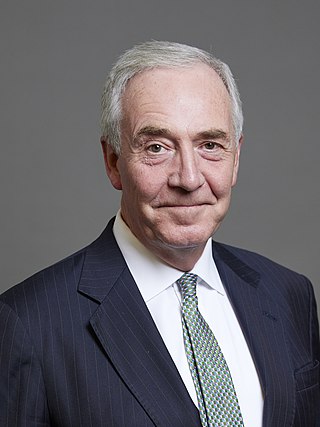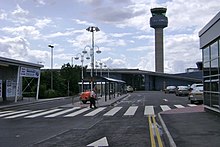
The Human Rights Act 1998 is an Act of Parliament of the United Kingdom which received royal assent on 9 November 1998, and came into force on 2 October 2000. Its aim was to incorporate into UK law the rights contained in the European Convention on Human Rights. The Act makes a remedy for breach of a Convention right available in UK courts, without the need to go to the European Court of Human Rights (ECHR) in Strasbourg.

The Supreme Court of Ireland is the highest judicial authority in Ireland. It is a court of final appeal and exercises, in conjunction with the Court of Appeal and the High Court, judicial review over Acts of the Oireachtas. The Supreme Court also has appellate jurisdiction to ensure compliance with the Constitution of Ireland by governmental bodies and private citizens. It sits in the Four Courts in Dublin.

The Prevention of Terrorism Act 2005 was an Act of the Parliament of the United Kingdom, intended to deal with the Law Lords' ruling of 16 December 2004 that the detention without trial of eight foreigners at HM Prison Belmarsh under Part 4 of the Anti-terrorism, Crime and Security Act 2001 was unlawful, being incompatible with European human rights laws.

Human rights in the United Kingdom concern the fundamental rights in law of every person in the United Kingdom. An integral part of the UK constitution, human rights derive from common law, from statutes such as Magna Carta, the Bill of Rights 1689 and the Human Rights Act 1998, from membership of the Council of Europe, and from international law.

United Kingdom administrative law is part of UK constitutional law that is designed through judicial review to hold executive power and public bodies accountable under the law. A person can apply to the High Court to challenge a public body's decision if they have a "sufficient interest", within three months of the grounds of the cause of action becoming known. By contrast, claims against public bodies in tort or contract are usually limited by the Limitation Act 1980 to a period of 6 years.

Robert John Reed, Baron Reed of Allermuir, is a British judge who has been President of the Supreme Court of the United Kingdom since January 2020. He was the principal judge in the Commercial Court in Scotland before being promoted to the Inner House of the Court of Session in 2008. He is an authority on human rights law in Scotland and elsewhere; he served as one of the UK's ad hoc judges at the European Court of Human Rights. He was also a Non-Permanent Judge of the Court of Final Appeal of Hong Kong.

The United Kingdom constitutional law concerns the governance of the United Kingdom of Great Britain and Northern Ireland. With the oldest continuous political system on Earth, the British constitution is not contained in a single code but principles have emerged over the centuries from common law statute, case law, political conventions and social consensus. In 1215, Magna Carta required the King to call "common counsel" or Parliament, hold courts in a fixed place, guarantee fair trials, guarantee free movement of people, and free the church from the state; it also enshrined the rights of "common" people to use the land.
Civil liberties in the United Kingdom are part of UK constitutional law and have a long and formative history. This is usually considered to have begun with Magna Carta of 1215, a landmark document in British constitutional history. Development of civil liberties advanced in common law and statute law in the 17th and 18th centuries, notably with the Bill of Rights 1689. During the 19th century, working-class people struggled to win the right to vote and join trade unions. Parliament responded with new legislation beginning with the Reform Act 1832. Attitudes towards suffrage and liberties progressed further in the aftermath of the first and second world wars. Since then, the United Kingdom's relationship to civil liberties has been mediated through its membership of the European Convention on Human Rights. The United Kingdom, through Sir David Maxwell-Fyfe, led the drafting of the Convention, which expresses a traditional civil libertarian theory. It became directly applicable in UK law with the enactment of the Human Rights Act 1998.
Article 8 of the European Convention on Human Rights provides a right to respect for one's "private and family life, his home and his correspondence", subject to certain restrictions that are "in accordance with law" and "necessary in a democratic society". The European Convention on Human Rights (ECHR) is an international treaty to protect human rights and fundamental freedoms in Europe.

Cadder v HM Advocate [2010] UKSC 43 is a decision in which the Supreme Court of the United Kingdom held that the way in which police in Scotland detained suspects was not compatible with the European Convention on Human Rights and was therefore unlawful in terms of the Scotland Act 1998.

In the United Kingdom, the Investigatory Powers Tribunal (IPT) is a judicial body, independent of the British government, which hears complaints about surveillance by public bodies—in fact, "the only Tribunal to whom complaints about the Intelligence Services can be directed".

R v Horncastle & Others[2009] UKSC 14 was a decision of the Supreme Court of the United Kingdom regarding hearsay evidence and the compatibility of UK hearsay law with the right to a fair trial under Article 6 of the European Convention on Human Rights (ECHR). The case represents another stage in the judicial dialogue between the European Court of Human Rights (ECtHR) and the higher courts of the United Kingdom about whether it is acceptable to base convictions "solely or to a decisive extent" on evidence made by a witness who is identified but does not appear in court.

R v The Commissioner of Police of the Metropolis [2011] UKSC 21 was a 2011 judgment of the Supreme Court of the United Kingdom. The case concerned the extent of the police's power to indefinitely retain biometric data associated with individuals who are no longer suspected of a criminal offence. In the case, a majority of the Supreme Court, including the Court's President Lord Phillips and the Lord Chief Justice Lord Judge reversed an earlier ruling of the High Court of Justice and found that the police force's policy of retaining DNA evidence in the absence of 'exceptional circumstances' was unlawful and a violation of Article 8 of the European Convention on Human Rights. The court declined to offer any specific relief however, recognising that the policy is expected to be subject to legislative scrutiny as Part 1 of the Protection of Freedoms Bill 2011.
The Independent Reviewer of Terrorism Legislation is an independent person, appointed by the Home Secretary and by the Treasury for a renewable three-year term and tasked with reporting to the Home Secretary and to Parliament on the operation of counter-terrorism law in the UK.
Zakharov v. Russia was a 2015 court case before the European Court of Human Rights involving Roman Zakharov and the Russian Federation. The Court ruled that Russia's legal provisions governing communications surveillance did not provide adequate safeguards against arbitrariness or abuse, and that therefore a violation took place of Article 8 of the European Convention of Human Rights.

The Children and Young People (Scotland) Act 2014 is an Act of the Scottish Parliament passed on 19 February 2014 and received royal assent on 27 March 2014. The legislation is part of the Scottish Government's Getting it right for every child policy implementation.

David William Kinloch Anderson, Baron Anderson of Ipswich, is a British barrister and life peer, who was the Independent Reviewer of Terrorism Legislation in the United Kingdom between 2011 and 2017. On 8 June 2018 it was announced that he would be introduced to the House of Lords as a cross-bench (non-party) working peer. On the same day he was appointed a Knight Commander of the Order of the British Empire (KBE), for services to national security and civil liberties, in the Queen's 2018 Birthday Honours.

Malone v United Kingdom [1984] ECHR 10 is a UK constitutional law case, concerning the rule of law.

Begum v Home Secretary [2021] UKSC 7 is the short name of three closely connected proceedings considered together in the Supreme Court of the United Kingdom, R v Special Immigration Appeals Commission; R v Secretary of State for the Home Department; and Begum v Secretary of State for the Home Department, concerning Shamima Begum, a woman born in the United Kingdom who at the age of 15 travelled to Syria to join the Islamic State of Iraq and the Levant (ISIS). Her intention to return to England in 2019 resulted in a public debate about the handling of returning jihadists.











